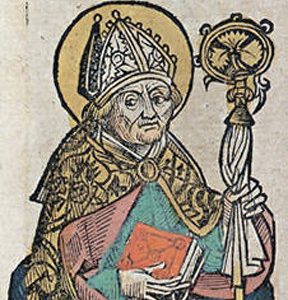This fourth article of the Magnificat series aims to reflect on these words of Our Blessed Mother: “Henceforth all generations will call me blessed…” (Luke 1:48).
Blessed is she who believed that there would be a fulfillment of what was spoken to her from the Lord. (Luke 1:45)
The Blessed Virgin Mary believed the words God spoke to Her through the angel Gabriel, believed that She would conceive the Son of God by the power of the Holy Spirit, believed that She would be the Mother of God. The Holy Spirit speaks the above words through Elizabeth, and Our Blessed Mother responds with these spoken by the Holy Spirit through Her:
Henceforth all generations will call me blessed. (Luke 1:48)
With these words, the Mother of God “prophesies the Marian praises of the Church for all the future, the Marian devotion of the People of God until the end of time. In praising Mary, the Church did not invent something ‘adjacent’ to Scripture: she responded to the prophecy which Mary made . . . It is a real prophecy, inspired by the Holy Spirit, and in venerating Mary, the Church responds to a command of the Holy Spirit; she does what she has to do” (Pope Benedict XVI, Homily, 2006).
“Henceforth all generations will call me blessed” (Luke 1:48). These prophetic words of the Blessed Virgin Mary find fulfillment in the “Hail Mary” prayer (cf. Pope Saint John Paul II, Rosarium Virginis Mariae, n. 33), where the words of Elizabeth, spoken through her by the Holy Spirit—“blessed are you among women and blessed is the fruit of your womb”—are perpetuated until the end of time. Elizabeth is the first among all future generations to call Our Blessed Mother “blessed” (cf. Catechism of the Catholic Church, n. 2676).
Let us reflect further on the Hail Mary.
Elizabeth is not given the Name of the Son of God, nor does the Blessed Mother mention It, since the appointed time had not yet come for Her to name Him. The Holy Name of Jesus is inserted by the Church into the prayer after Elizabeth’s words, as the apex of the entire prayer, its summit, which unites its two parts (cf. Pope Saint John Paul II, Rosarium Virginis Mariae, n. 33).
The first part of the Hail Mary begins with the words of God spoken to Our Blessed Mother through the angel Gabriel: “Hail Mary [or Rejoice Mary]” (CCC, 2676). Rejoice, O Blessed Virgin Mary, at the good news that the Messiah will be conceived in your womb at the moment of Your consent, by the power of the Holy Spirit. Rejoice! This is a Messianic joy (cf. Pope Saint John Paul II, Rosarium Virginis Mariae, n. 20).
The words that follow are those God uses to address the Mother of the Son of God: “full of grace” (Luke 1:28). She is the Immaculate Conception, preserved from the stain of original sin from the first moment of Her conception, and from actual sin throughout her whole life. She is entirely filled with the Presence of God: “The Lord is with you!” (Luke 1:28).
As we read in the Catechism:
Full of grace, the Lord is with thee: these two phrases of the angel’s greeting shed light on one another. Mary is full of grace because the Lord is with her. The grace with which she is filled is the presence of him who is the source of all grace. (2676)
Following these words are those of the Holy Spirit spoken through Elizabeth, and the Holy Name of Jesus which connects the first part of the “Hail Mary” to the second part, given to us by the Church at the Council of Ephesus in the year 430 (cf. Saint Louis de Montfort, Secret of the Rosary, Fifteenth Rose). It is because Jesus is the fruit of Her womb, because She is the Mother of God, that the Church implores Her intercession (cf. Pope Saint John Paul II, Rosarium Virginis Mariae, n. 33). The all-Holy Mother is most powerful; Her prayers bear the force of command with Her Son, since He refuses Her nothing.
Our Blessed Mother asks, and Her prayer is granted, as at Cana, when Jesus performs His first miracle in the order of nature even though as He says: “Woman, what is that to me and to thee? My hour has not yet come” (John 2:4, Douay-Rheims Bible). Yet the Blessed Virgin knows He will grant Her request. She does not tell Jesus how to solve the problem, but simply presents it to Him and leaves its solution in His hands while telling the servants: “Do whatever He tells you” (John 2:5). This is a model for us in our prayer of petition: “Holy Mary Mother of God, pray for us sinners now and at the hour of our death.” We present our needs to the Mother of God, “pray for us sinners,” and leave the solution in Her hands and in Jesus’ hands, while striving to do whatever He tells us.
Blessed are you among women . . .
All generations until the end of time will call the Blessed Virgin Mary “blessed” both through the Hail Mary and through the “Divine Praises.” Pope Benedict XVI says:
We do not praise God sufficiently by keeping silent about his saints, especially Mary, “the Holy One’” who became his dwelling on earth. The simple and multiform light of God appears to us exactly in its variety and richness only in the countenance of the saints, who are true mirrors of his light. And it is precisely by looking at Mary’s face that we can see more clearly than in any other way the beauty, goodness and mercy of God. In her face we can truly perceive the divine light.
And so it is as well that in the Divine Praises, after praising God the Father, God the Son, and God the Holy Spirit, the Church praises the Blessed Virgin Mary, Mother of God, then Saint Joseph, Her Most Chaste Spouse, and ends by blessing God in His angels and saints.
Divine Praises
Blessed Be God
Blessed be His Holy Name
Blessed be Jesus Christ true God and true Man
Blessed be the Name of Jesus
Blessed Be His Most Sacred Heart
Blessed be His Most Precious Blood
Blessed be Jesus in the Most Holy Sacrament of the Altar
Blessed be the Holy Spirit the Paraclete
Blessed be the great Mother of God, Mary most Holy
Blessed be Her Holy and Immaculate Conception
Blessed be Her glorious Assumption
Blessed be the Name of Mary, Virgin and Mother
Blessed Be St. Joseph Her Most Chaste Spouse
Blessed be God in His angels and in His saints
And thus, all generations call her blessed.
Image from ArtUK.org














